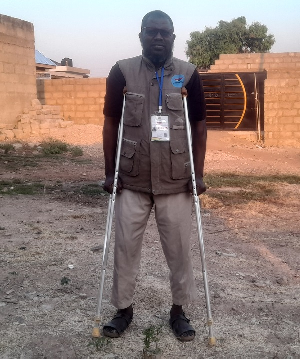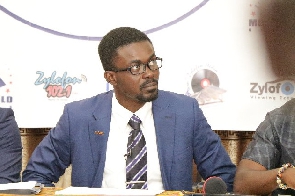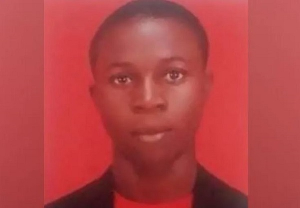When my editor served notice for our first training for the 2024 general elections, I was immediately thrown into a state of dilemma as to whether I could also be able to cover the electoral process like my colleagues as the Upper West Regional correspondent for the highly reputable online portal -GhanaWeb, having been poised not to be left out.
This was due to my peculiar situation as a physically challenged person who was likely to be faced with the difficulty of accessing public buildings and places to enable me to manoeuvre my way through to discharge my duties successfully, knowing the lack of enforcement of the Persons with Disability ACT 2006 (ACT 715) in the country 18 years after its enactment.
Aided in my mobility with crutches due to my temporal disability since 2016 resulting from multiple spinal disc protrusions, I was nonetheless, determined to go through the pains to cover the elections driven by my passion for the noble profession and the love for mother Ghana.
Despite the vagaries of the harsh harmattan weather conditions noted for this area at this time of the year, I was able to shake it off arriving at my first station at the Huriya JHS polling centre at around 5:30 am with 10 voters already in attendance waiting for the arrival of the EC officials.
While determined to find a way out through the assignment to accomplish this significant milestone as every journo enjoys doing, the realisation of being confronted with teething challenges in accessing certain polling stations and public structures immediately dawned on me because of their inaccessibility for differently abled persons.
Having forced to live my life reminiscent of a couch potato for the past eight years as I usually step out only out of necessity due to the severe pains I endure from my spinal nerve compressions despite the usage of my crutches to move around, as a result, I always try to minimise my mobility as much as possible to avoid the excruciating pains that come with it.
December 7, was an important one for me after failing to cover the 2016 and 2020 due to my condition. I was therefore determined to defy the odds to rise up to the occasion and by the Grace of the Almighty, I was able to do so navigating through the pain barrier with the help of my colleagues.
Let me seize this opportunity to commend my affable GJA Chairman, Sualah Abdul-Wahab as well as my colleagues such as Jinsung Rashid, Digme Kantayir Robert, Martina Baazog and GBC's cameraman, Nathaniel, for the various roles played to help me cover the polls effectively.
In setting out to work, there were polling stations that proved to be inaccessible. I remember when we arrived at the Nayiri High Court polling station where the Member of Parliament for Wa Central cast his ballot, I could not take my shots on my own having noticed a gutter in between me and the polling station with the pavement few meters away.
But realising I could not risk trying to jump over it and likely become the news for my colleagues present, to overshadow the coverage of the casting of the ballot by the Wa Central MP in the event I missed my steps and fell, I had to wait there and rely on a colleague to get the work done for me on that occasion.
So after going through all those challenges at the polling stations and partaking in the 'night vigil' at the constituency collation centre till Sunday morning around 9:am after the declaration of the constituency results, I proceeded to the regional collation centre only to be greeted by a disability unfriendly building since the collation was scheduled to take place at the upstairs of the EC's Regional Office.
As a result, I had to cover the exercise from downstairs with the help of colleague journalists, while sitting in the midst of security personnel providing security for the process on the forecourt of the EC office.
This unexpected obstacle left me scratching my head wondering why after the enactment of the Persons with Disability ACT 2006, (ACT 715) almost two decades now, such a critical public institution was still housed in a disability-unfriendly building that had no ramps in this day and age, which cannot be said of other jurisdictions where disability-inclusivity and rights of differently abled persons is of utmost importance to its citizens.
The experience reminded me of the clear manifestation of the lack of commitment by successive governments as a people to champion the rights of People Living With Disabilities (PWDs).
This highlights the negligence by our authorities to prioritise the rights of PWDs which they continue to pay lip service to, which can pass as a form of stigma, but acknowledging the contribution of the community only during elections through their manifestoes and campaigns in order to woo them to their side.
In the just-ended general elections, for instance, the campaign of some presidential candidates was characterised by the use of sign language interpreters to ensure their campaign message reached everyone, including people with hearing impairment.
It must be noted that being physically challenged is not a choice or fault of the person but acquired through congenital means, a disease or accident which everyone is prone to, raising concerns about the lack of enforcement of the Persons with Disability ACT 2006, (ACT 715).
It is sad to add that although the ten-year (10) moratorium incorporated in the Persons with Disability ACT 2006, (ACT 715) for all public buildings to be made accessible and available to persons with disabilities elapsed in 2016, there is still absolutely no commitment by successive governments to see to its enforcement, eight (8) years after the end of the moratorium.
Directive by President John Mahama to assemblies in 2013
In 2013, then President, John Dramani Mahama, gave a directive to Metropolitan, Municipal and District Assemblies not to give permits to developers whose building plans had no adequate provision for persons with disabilities while assuring that the government would also reconstitute the Disability Council with committed and competent persons to continue to fight for the interests of persons with disabilities.
According to him, persons with disabilities did not need sympathy from any Ghanaian, but the focus should rather be geared towards getting them fully integrated into society without any discrimination.
He noted that plans had been put in place to ensure the standardisation of disability-friendly building designs to be complied with by departments and agencies when erecting future structures that would give easy access to persons with disability (PWDs).
"Those designs are ready and are going to be given to the departments and agencies so that in future, if they are putting up any buildings those are the designs," the then president said.
The question is, will the incoming NDC government exhibit its commitment to protect the rights and welfare of PWDs by the reinforcement of the ACT?
The Persons with Disability ACT 2006, (ACT 715)
The Persons with Disability Act 2006, (ACT 715), was passed in 2006 to protect and promote the rights of differently abled persons in Ghana, the purpose of which was to ensure their rights are enforced as guaranteed by the Constitution.
The act covers thematic areas such as rights, accessibility, employment, education, transportation and healthcare for PWDs.
The ACT which also established the National Council on Persons with Disability (NCPD) charged with the development of policies and strategies to implement the Act, is made up of 61 clauses grouped into sections such as rights, employment, education, transportation, and healthcare.
Considered a significant milestone in its creation, the Act was hailed as a big step in Ghana's human rights discourse even though it also came under criticism by a section of the citizenry over the exclusion of provisions on non-discrimination, the gender dimension of discrimination, and the rights of differently abled children in the ACT.
Is the ACT a hoax or a reality?
Sadly, despite the enactment of the ACT eighteen (18) years ago, successive governments over the years have failed to ensure it sees the light of day as the rights of PWDs continue to be trampled upon.
Our public building structures are still being erected without adequate provisions for PWDs whilst our health facilities in the country are run without sign language interpreters to assist patients with hearing impairment for quality healthcare which is a right for every citizen.
Despite continuous calls for an increase in the training of more teachers of sign language in our training colleges to facilitate its use nationwide, especially in our critical public institutions, very little has been done in that respect.
Almost all our television stations in the country do not have sign language interpreters in order to keep those with hearing impairment informed and up to date with happenings in the country and beyond.
Till today, our visually impaired students still have limited access to their areas of interest of study in our tertiary institutions because of a lack of logistical provisions for the facilitation of their studies such as braille materials.
Persons with disabilities still suffer a lot of stigma from employers as they are often discriminated against in their pursuit of employment opportunities.
Meanwhile, Section 6 of the Persons with Disability Act 2006 (Act 715) of Ghana requires that public places should be accessible to people with disabilities:
"Owners and occupiers of public places must provide facilities to make their spaces accessible and usable for people with disabilities."
You can also watch a compilation of the latest Twi news below:
Click to view details



Politics of Wednesday, 18 December 2024
Source: Ilyaas Al-Hasan, Contributor

















